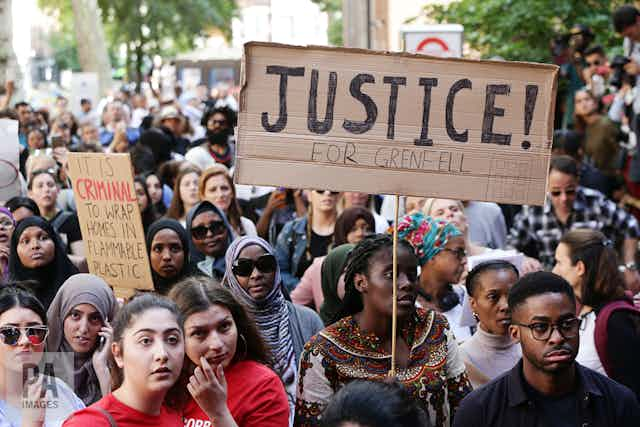The Grenfell Tower inferno has caused widespread anger and a deep desire for justice for those who were killed. In times of crisis scapegoats are often used to stem public rage. Public figures resign or are sacked as leaders try to show they can make tough decisions. But the culling of convenient scapegoats may just be another obstacle to the deep learning that is required to stop such tragedies from happening again.
Crises of the Grenfell Tower magnitude are often associated with a period of intense activity and confusion, which experts refer to as “operational crisis”. Its Greek roots take into account the period immediately following this – “krisis” refers to tensions calling for critical judgements informing future decisions. Such judgements can be skewed when the public reaction to crisis is particularly emotional – such as when terrible accidents happen to innocent or ordinary people.
Such emotional reactions can be explained by the “survivor’s syndrome” concept developed by psychoanalyst Menzies Lyth in 1989. This is the “guilt” felt by people for having been close to the accident without having noticed its incubation. One way of coping with guilt is by attributing blame to an individual or a group of individuals – the so-called “scapegoats”. The notion of scapegoating is deeply ingrained in the collective consciousness but some argue that it prevents organisations from learning from crises.
The ‘first’ scapegoat

Although most probably only a mythological figure, Iphigenia was the first recorded case of “scapegoating” in human history. The eldest daughter of King Agamemnon and Queen Clytemnestra of Argos, Iphigenia was sacrificed by her own father and the commander-in-chief of the Greek fleet in Aulis, where they had gathered for their long journey to Troy. To appease the gods and avert the emerging crisis, Agamemnon was advised by the seer Calchas to offer his daughter as a human sacrifice to the gods. Under the increasing pressure of the other Greek commanders, Agamemnon eventually agreed to do it. Iphigenia’s sacrifice appeased the angry gods, allowed Agamemnon to regain the trust of his subordinates and essentially paved the way for the successful – albeit lengthy – campaign of the Greeks to Troy.
The myth resonates today, where there are numerous examples of leaders making significant personal sacrifices, or otherwise being personally sacrificed themselves, in the name of catharsis of their group’s consciousness. From the Colectiv club fire in Romania, which overthrew the government, to the tower block fire in London, which led to the resignation of the Kensington and Chelsea Council chief executive for “perceived failings”, there are plenty of examples of social crises being “resolved” – if only temporarily – through the sacrifice of a central leading figure. In some cases, this may well stop further questions being asked.
Social psychologists would suggest that this is a way through which a social collective (a group, an organisation, a nation) facing cognitive dissonance – such as the collective anxiety experienced in the aftermath of a preventable crisis – returns to an acceptable psychological equilibrium. One particularly effective mechanism which leads to such balance is that of attributive projection – where the collective projects its negative thoughts, emotions and feelings onto its leader and then forces them to sacrifice themselves to help “vanish” their negative emotions.

The problem, however, is that although it allows the collective to cope with the aftermath of a crisis, it does not afford it the time, space and motivation to reflect and “make sense” of the factors which led to it. In this sense, projecting blame inhibits the “deep learning” which enables transformational change.
This interpretation resonates with the aftermath of the Grenfell Tower disaster. The victims – some of the poorest in the society – were seen in sharp contrast to millionaire home owners in the same borough. This created strong emotional reactions, ranging from tributes for the victims to rage against decision makers at all levels. This view continued despite the observation that it may take a long time to unravel exactly who is to blame for the tragedy.
Deeper learning
The societal guilt of those who have not had the misfortune to be either in Grenfell or in Grenfell-like accommodation creates a collective anxiety, a generalised wish to do something. This is understandable in so far as to ensure that such accidents can be avoided in the future. Yet it is hard to see how the dynamics leading up to the resignation of the council’s chief executive at the express request of Sajid Javid, the communities and local government secretary, could actually directly contribute to lessons being learned. Rather – from the lenses of attributive projection – this move might just be short-circuiting the deeper learning which could be taking place.
This may involve learning about the right balance between consumerism and citizenship when expecting market-led, yet high quality public services; learning about justice when it is the marginalised and the poor who are first hit by disasters; and learning about business ethics in public housing and elsewhere where profit margins increase by stretching the interfaces between the letter and the spirit of safety regulations.
So to earlier observations that the Grenfell fire is a political failure, we add that it can become a social one if the public accepts a human sacrifice without addressing more fundamental precursors to the crisis. Even if that sacrifice comes in the form of an unpopular leader who is politically accountable to some degree, if it comes in isolation without serious attempts to address the more fundamental causes of the crisis, then society is doomed to carry on making the same mistakes which will accumulate and surface as crises.

